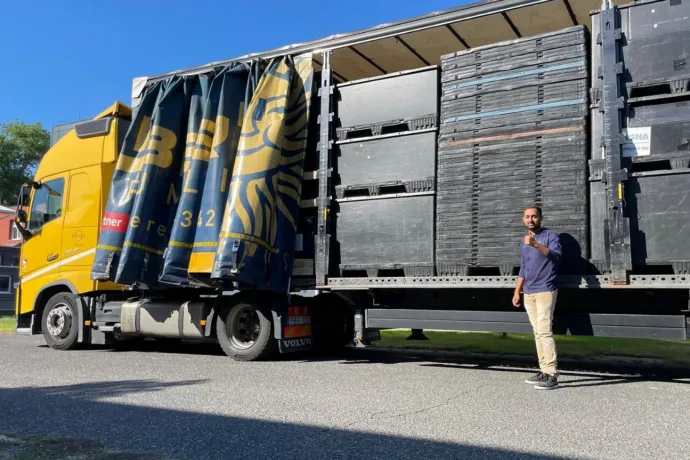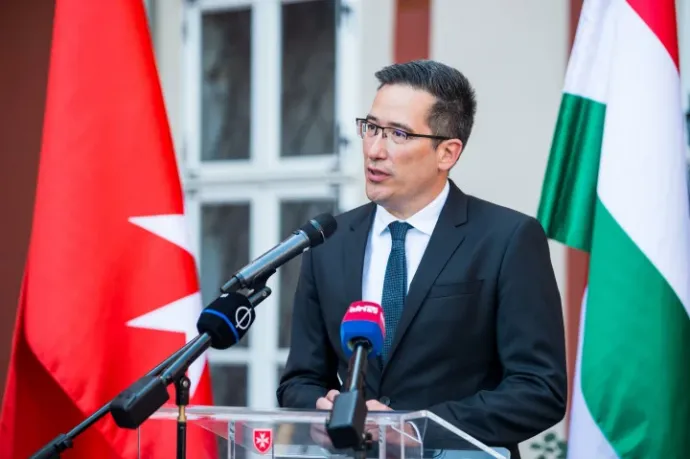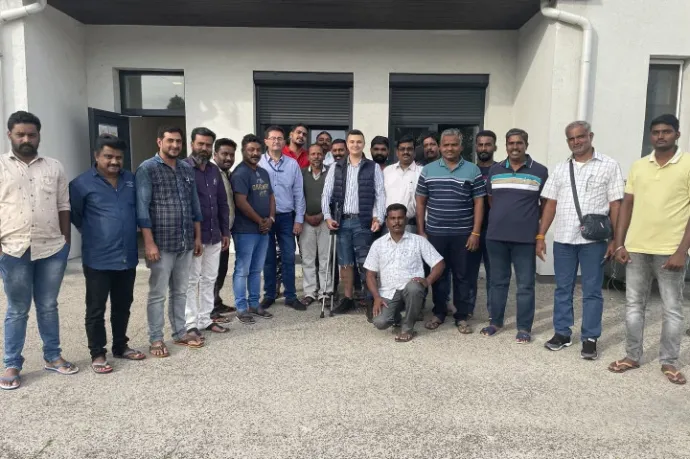
Despite the different, left-hand traffic system in Hungary, driving habits that take some getting used to and language difficulties, more and more professional drivers from India and other non-European countries are working in Hungary. According to industry reports, female truck drivers from India could soon be arriving as well, but the CEO of Waberer's, Hungary's biggest trucking company, told Telex that the process has been going on for two years. So far, the Indian staff working for the company are all male and among the most reliable, although there were problems with recruitment at first. Among truck drivers from outside Europe, only drivers from the Philippines outnumber Indians.
There are around half a million truck driver jobs vacant across Europe and at least 8,000 in Hungary, and despite high monthly salaries, it is difficult to find new recruits. Long absences, usually of 2-3 weeks, frequent loading jobs, and often inadequate roadside rest stops – the lifestyle that comes with the job – are becoming less and less attractive for career starters, and the fact that a truck driving licence and the related exams can cost up to two million forints in total is not encouraging either.
In the past, many came from Ukraine, but the war put an end to that, and replacements from Romania or Bulgaria are not a solution to the problem here, because there are also many vacancies in this field in neighbouring countries.
In addition to the above, there are several reasons for the increasing number of professional drivers from India, as well as Asia and African countries arriving in Hungary in the last year or two. We interviewed Zolt Barna, CEO of Waberer's International and President of the Hungarian Road Transport Association (MKFE), after a recent news report that they will soon be recruiting women from India. Initially, twenty-five women may arrive, but in five years the number could reach eight hundred, according to a report in the Trans.info industry portal.
There are many companies waiting for them, as Hungary is the country that most young employees leave for Western Europe, with the average age of drivers remaining in the country currently 47. Incomes in Hungary are below Western levels, while labour shortages have been so acute since the coronavirus epidemic that they threaten to disrupt transport chains.
Waberer's has hired 50 Indian employees in the past year and is expecting another 20 next month, and although there are no women among them yet, Zsolt Barna says that in total there could be 100 truck drivers from India working in Hungary. The company has also been working with Bányai & Partners Consulting, a consultancy firm that has been in the news for recent recruitment, but they are not the only ones looking for drivers for Hungarian jobs in other countries.
In a statement to Telex, Bányai & Partners Consulting, said that they also recruit Indian staff for smaller and larger companies, including some working at Magyar Suzuki Ltd, and twenty drivers are arriving at TT Sped in Hajdú-Bihar County, who could hopefully be ready to start work in six weeks. Tibor Bányai stresses that women need to have the same competencies as men to fill these jobs, but they helping them achive this under an equal opportunities programme.
Bányai says that it is not common for people from India to want to settle in Hungary. Instead, they transfer the income they have earned here to their families back home. The first female truck driver candidates from India will soon submit their applications for residence permits at the Consulate General of Hungary in Mumbai, which will be processed by the Directorate General of Immigration. In an ideal scenario, the first group will arrive in Hungary in May.
An equal opportunities programme could also help alleviate the European driver shortage
Viktor Hricz, manager of the Danish company Baton Transport's local branch, told Telex that the company has launched an equal opportunities programme called Trucking for Equality, and as part of this they are looking for female drivers in India. The idea came from Baton owner Claus Hansen and was born after a woman applied for an international driver recruitment programme in Sehlem, India, along with a hundred men.
The woman was brave and motivated, and although she did not pass the practical test, the company decided to use its own resources to change the stereotype that truck driving is a job for men only, focusing on gender equality. As Hricz puts it, India was ranked 135th out of 146 countries in last year's World Economic Forum report on gender gaps, so there is much to be done.
Baton, in cooperation with Indian NGOs and a local recruitment company, takes a few months to prepare Indian women for jobs as truck drivers in Europe as well as life in Europe and Hungary. Among other things, they are made aware of their rights, local cultural customs and lifestyle, and then offered in-depth training to become more independent and confident. If they do not have a driving licence, they are taught how to drive a car so that they can find work as a taxi driver or, with further training, as a truck or bus driver.
The best participants of the programme in India can apply to become international truck drivers, come to Europe after completing the above-mentioned process and start working in Hungary, but later they will also have the opportunity to drive in Western Europe, as the Danish transport company is present in several countries. The company will accompany them throughout the whole process, so it will also help them to settle in, provide them with accommodation and help them with private matters if needed. The representative of Baton Transport added that special attention is given to ensuring that the female drivers work in safe conditions and that they have adequate rest during their journey.
Candidates are expected to have a basic education and good English language skills, but not to be able to drive a truck, and will be trained in India, with the option to move their families to Hungary once they settle in the country. They will have to work five days a week and 15 hours a day, including 4.5 hours behind the wheel twice a day. In return, they can expect a monthly salary of €1,800 (around 700,000 HUF), but as can be seen, the expected workload is huge.

Non-European drivers applying for a job at Waberer's need a valid category C (truck drivers') driving licence and must also speak English, as at the other company, which in itself limits the pool of potential candidates. Zsolt Barna says that his first experiences were mixed, partly because of the imperfections in the recruitment process. As a result, some candidates whose language skills were not up to expectations were selected and they communicated with their examiners through an interpreter during the pre-selection process abroad. Some of them could indeed drive a truck, but were unable to adapt to the traffic conditions in Hungary, the right-hand traffic system or the drivers' willingness to obey the rules, and therefore had to go home.
Recruitment was not easy, but Indian drivers have been working in Hungary for a year
In some cases, those who arrived last year saw Hungary as a mere stepping stone and soon left for other EU countries to take up jobs there. Despite the initial problems, the head of Waberer's reported that the company is very happy with the Indian staff in their team. They are punctual, respectful, excellent at vehicle operation, keep their trucks clean, drive economically, for which they all receive a bonus, i.e.
they are as reliable as their best Hungarian colleagues, and there is no difference in their pay either.
It is not at all obvious how a driver from another continent can settle and integrate in Hungary and then start work. In this regard, Zsolt Barna said that in their experience, many of the people coming from India have already spent a long time away from their families, which is not uncommon in India, and they can support their loved ones with the money they send home.
The company offers a training period of six months, twice as long as usual, for those coming from far away, and during the courses, prospective employees receive reduced wages and accommodation. The Waberer's follow-up training includes not only 35 hours of driving practice, but also a course to prepare for the so-called GKI test (professional transport drivers' test) and the exam itself, as only people who hold a so-called driver qualification card can work as professional drivers in the European Union.
Although they do need to get used to the traffic conditions, Barna says that Indian drivers are better than average at manoeuvring long trailers, at reversing or ramp access, for instance. In addition, they only have to learn to handle the technical solutions of trucks that are much younger than the vehicles they used in their previous jobs, which are typically a few years old. The work organisation takes into account the fact that Indian drivers are used to left-hand traffic, which is rare in Europe, and are therefore often assigned to transport jobs in England, where they have to keep to the left as is customary in their home country.
Drivers from India, Africa and Asia can also get a language bonus if they learn Hungarian, but the CEO says there are few applicants for this option. The company's dispatching service is multilingual, as drivers can communicate with the centre in English and Russian, among other languages, in addition to Hungarian, which is also due to the fact that Waberer's is an international company with a subsidiary in Poland, where many non-Polish drivers also work.
2,000 euro monthly salary, but still not enough applicants
Both Zsolt Barna and Sándor Székely, president of the European Truck Drivers' Union (TESZ), who was also interviewed on the matter, agree that the increasing number of truck drivers recruited from non-European countries is not a definite solution to the labour crisis. Székely pointed out that for years there has been no professional training in Hungary, so professional drivers are in fact only semi-skilled workers, and the union, in agreement with the transport associations, has initiated the creation of a school-based training system for professional drivers, which would guarantee a minimum professional wage for workers upon finding a job, in addition to daily allowances. Currently, no tax is paid on the extra income from fuel savings or even on the international daily allowance of €60, which is 20-30% below the European average and has remained unchanged since 2016, because the laws here allow this.

Domestic daily allowances are even lower than the European average, so it is not surprising that many people simply move on after the expiry of their employment contracts, which are typically for two years, according to the TESZ president. Indian and Filipino drivers, who are also praised, like their Hungarian counterparts, take jobs in Austria, for example. There, pension and health insurance contributions, not just taxes, are paid on the full amount of their almost identical net wages, so their total income is included in their pensions and sickness benefits.
Commenting on the news of the arrival of women drivers in India, the two professionals interviewed said that although the profession has already been open to women, the vast majority of employees are still male. This is partly because loading tasks have still not been separated from driving, which is a tough physical strain for all, while at the same time further reducing the attractiveness of the career.
Women make up 1-2% of the current workforce in the sector, many of whom work in shifts with their partners, or as Sándor Székely puts it, "work four-handed", and Zsolt Barna added that Waberer's female staff include many skilled forklift drivers and light truck drivers, and they are always happy to employ women, but this does not mean that a significant proportion of the vacancies can be filled by women.
For more quick, accurate and impartial news from and about Hungary, subscribe to the Telex English newsletter!
And since you're here, we invite you to be a part of shaping Telex English! Take a few minutes to fill out our anonymous survey, and tell us what you think about Telex English and how it could be even better!